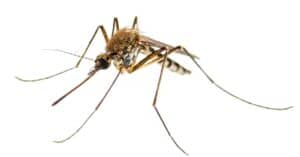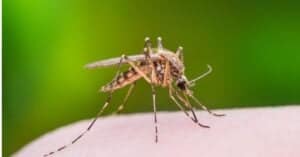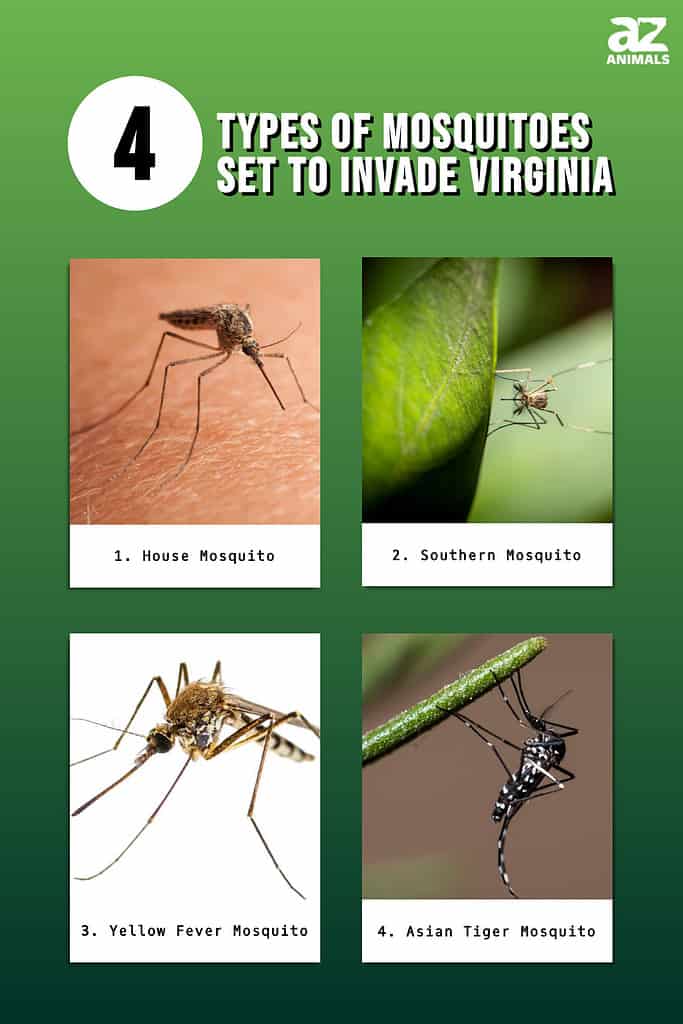
While residents in Virginia love summertime, they could do without pesky mosquitoes. There’s nothing worse than trying to enjoy spending time outdoors and suddenly these blood-sucking insects start swarming.
According to research, Virginia’s mosquito population is on the rise, and the state’s climate might be a major contributing factor. It all depends on how long it stays warm from the spring to the late fall. The mosquito season often starts in April and lasts through the end of the summer.
Let’s take a look at the most common mosquitos found in Virginia and what you can do to keep them away!
1. House Mosquito
The northern house mosquito, another name for this type of mosquito, is a reliable carrier of the West Nile virus and the main cause of worry for people living in northeastern regions where tropical mosquitoes don’t exist.
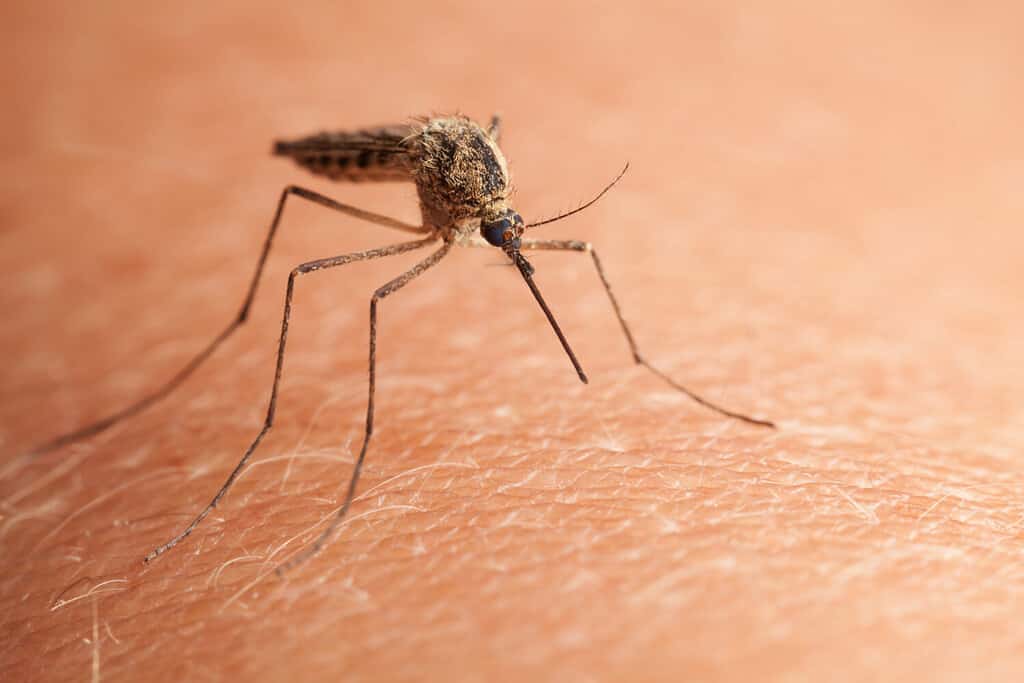
As reliable carriers of the West Nile virus, house mosquitoes are not harmless.
©Anest/Shutterstock.com
It’s vital to remember that these mosquitoes may overwinter as adults. This is unlike the majority of mosquitoes, which lay their eggs and disappear throughout the winter. Culex pipiens can even be discovered on the surface of the snow.
2. Southern Mosquito
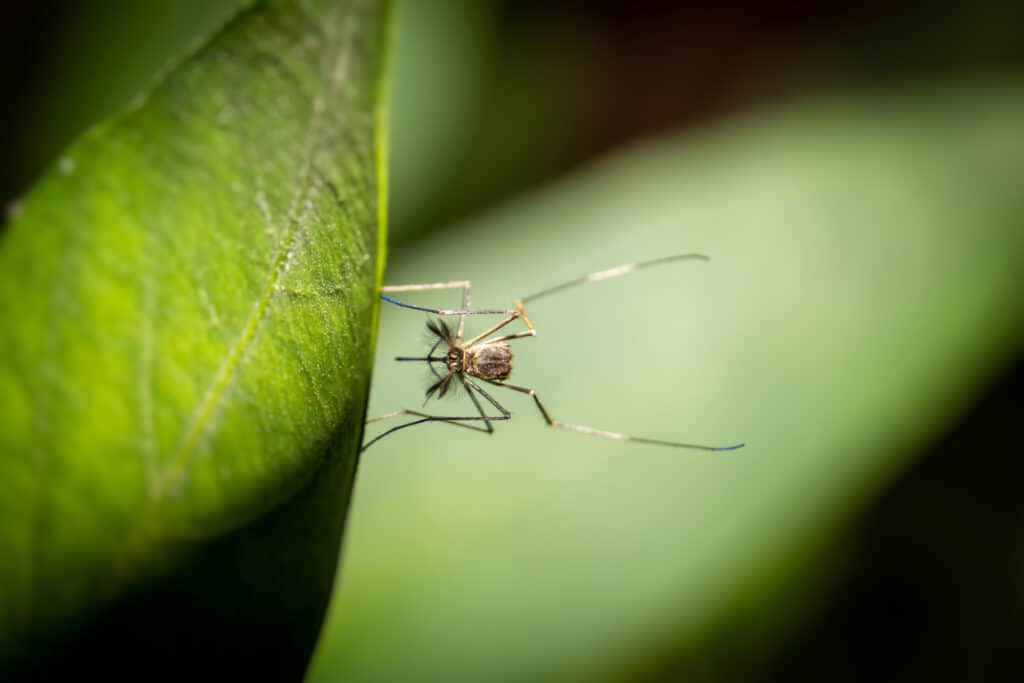
Like its northern counterpart, the southern house mosquito can carry illnesses, including the West Nile virus and Zika virus.
©iStock.com/Arnav Ray
Tropical and subtropical conditions support this species of mosquito, which is also known as Culex quinquefasciatus. It serves as a carrier for a variety of illnesses spread by mosquitoes, including the West Nile virus, Zika virus, avian malaria, and multiple encephalitis strains, to name a few.
This species has demonstrated a propensity for standing water close to drains, septic tank leaks, cesspools, and other sources of pollution.
3. Yellow Fever Mosquito
This particular type of mosquito is the main carrier of the Zika virus, despite being the main carrier of yellow fever. This is a mosquito to be on the lookout for when it comes to insects that transmit extremely harmful mosquito-borne illnesses that are not specific to the United States.
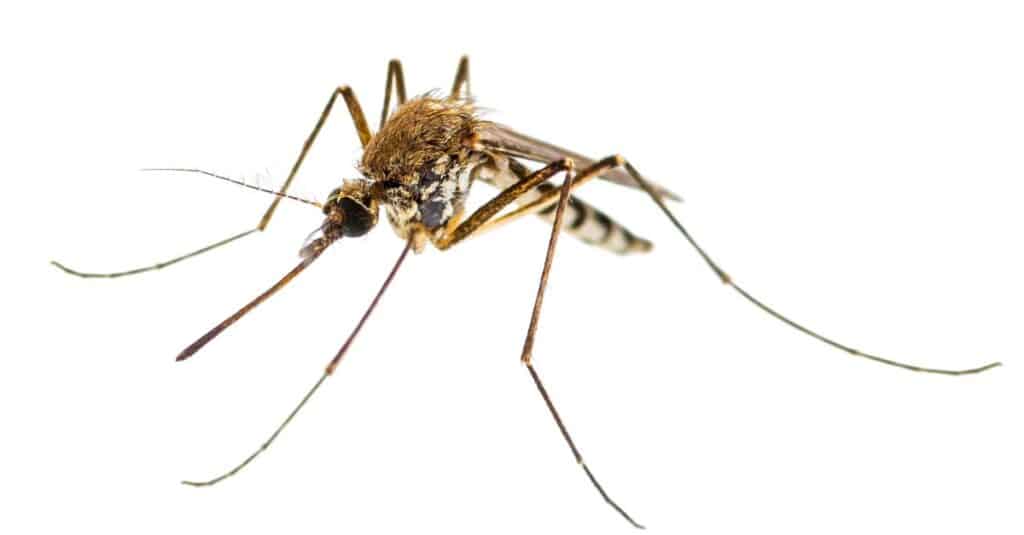
As its name implies, the yellow fever mosquito can carry yellow fever.
©iStock.com/nechaev-kon
This includes yellow fever, Zika, and Chikungunya. Additionally, it is the main carrier of the virus that causes dengue fever, a menace that is spreading globally. These types of mosquitoes can breed in stagnant ponds that are only an inch deep.
4. Asian Tiger Mosquito
When you’re in Virginia, the Asian tiger mosquito is likely the species you come in contact with the most. Because of its patterned appearance, this mosquito species, also known as a forest mosquito, is given the name “tiger.”
This mosquito is a tropical and subtropical species that is regarded as a key transmitter for the spread of several viruses. These include West Nile virus, Zika virus, yellow fever, dengue fever, chikungunya fever, and more.
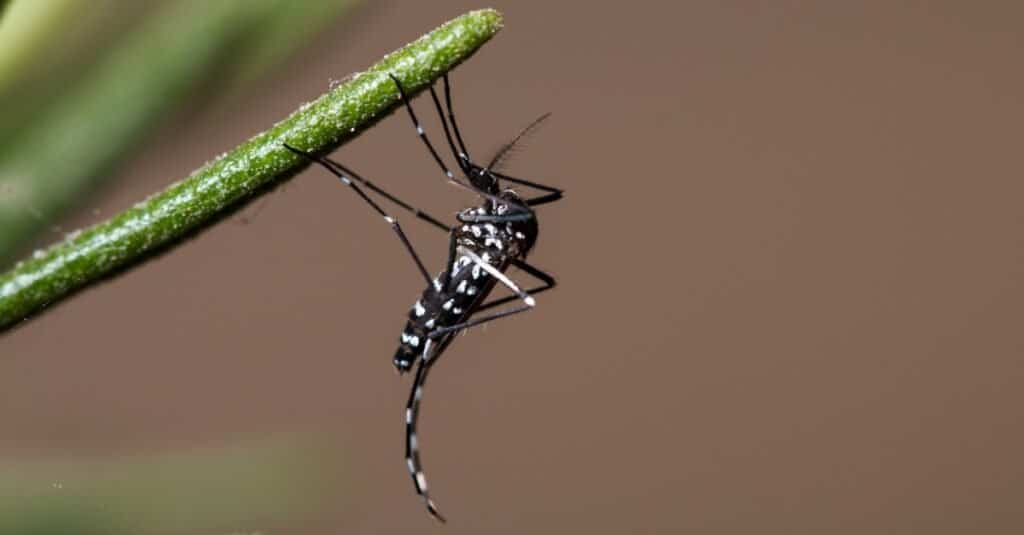
Asian tiger mosquitoes generally lay their eggs near bodies of water, rather than in the water itself.
©Oliver Spiteri/Shutterstock.com
Unlike other mosquito species, female tiger mosquitoes typically lay their eggs close to still bodies of water rather than in the water itself. They can, though. They can breed using a supply of water that is flowing in addition to laying eggs in a vessel of water.
What Attracts Mosquitos
There might be scientific explanations for why you seem to get bit by mosquitoes more frequently than other people. By studying what makes you a good snack for mosquitoes and finding simple ways to deter them, you may help safeguard yourself and your loved ones from those irritating bites and diseases carried by mosquitoes. Below you’ll find what attracts mosquitoes to certain people!
Your Blood Type
Given that these tiny parasites feed only on blood, it seems reasonable that scientists would want to learn which blood types mosquitoes prefer or whether they even have a preference. Aedes albopictus mosquitoes landed on persons with type O blood nearly twice as frequently as they did on people with type A blood.
This is according to a short study of 64 subjects from the Institute of Pest Control Technology. This study suggests that while your blood type may have a tiny impact on a mosquito’s desire to bite, you cannot alter your blood type to stay away from these annoyances.
The Clothes You Wear

Sleeveless clothing and short sleeves will attract more mosquitoes to you than longer sleeves.
©Beatriz Vera/Shutterstock.com
Mosquitoes look for possible prey by using visual clues. Because they can perceive humans wearing colors that contrast more easily, they might bite them more frequently. Additionally, exposing a lot of flesh may make it simpler for these blood-sucking pests to locate their next meal.
Wear long sleeves, long pants, and closed-toed shoes to help reduce your appeal to mosquitoes. Additionally, it’s ideal to wear loose-fitting clothing because mosquitoes can pierce textiles that are too tight for comfort.
Drinking Alcohol
We don’t want to ruin any outdoor parties you may have planned, but drinking alcohol could also make you more attractive to mosquitoes. Mosquitoes use their noses to locate you in the evening as the sun sets.
A few beers speed up your heartbeat and increase the amount of carbon dioxide your body produces. Additionally, your body releases specific molecules when you take alcohol. When seeking nourishment, mosquitoes are drawn to the fragrance of both.
Smells!
Mosquitoes may find you more alluring if you have certain fragrances on. Which fragrances are they? It usually refers to any floral odor. Mosquitoes, after all, are drawn to delicious plant nectars rather than just blood, which is why they also feast on blood.
If you enjoy wearing floral-scented perfumes, you may choose to abstain if you’re going to be spending the day outside. If you’re going camping, make sure to bring a scent-free hand soap as well!
Clogged Drains
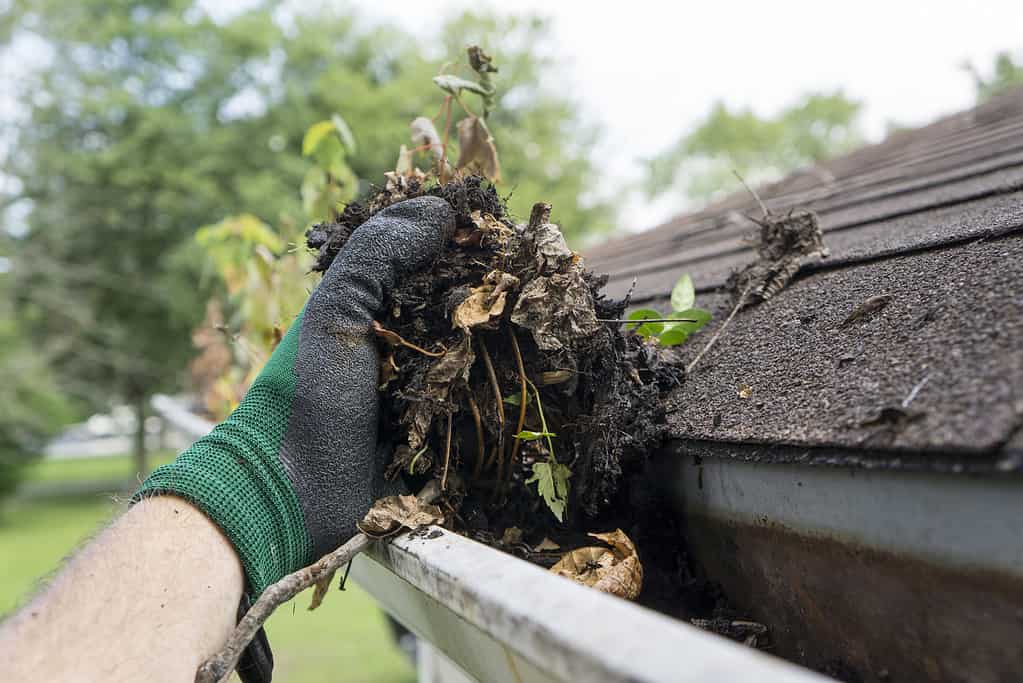
Clogged gutters accumulate water, creating standing water that’s perfect for mosquitoes.
©iStock.com/IndyEdge
When fallen leaves, twigs, and other materials are left in gutters and drains for an extended period of time, they restrict the flow of water. Because they offer mosquitoes shelter from the wind and a place to accumulate standing water, these piles of rubbish make the ideal mosquito habitat.
Keep your gutters and pipes free of obstructions to allow water to flow freely so that mosquitoes won’t congregate there.
How to Keep Mosquitoes Away
Nobody wants to be bombarded by these pesky pests. Thankfully, there are numerous natural ways to keep them away in the first place! Whether you’re planning a fun camping trip or just want to enjoy a beverage on your patio, here are a few handy tricks to get rid of mosquitoes!
DEET
Spraying surfaces rather than the skin lessens exposure to the chemicals in bug spray, while still achieving acceptable outcomes. If you’re going to use treatments with DEET or other home insecticides, try spraying the environment before yourself.
Spray tablecloths, drapes, and seat seats. Additionally, you may spray some on a towel and hang it from an upright object or even a tree branch! Be extra cautious while handling soft plastics after putting DEET on your skin because it has a corrosive effect that could be harmful.
Essential Oils

Several essential oils are useful as a mosquito repellent.
©FotoHelin/Shutterstock.com
Mint may be utilized in an array of ways and is particularly useful against insects and mosquitoes. Try permanently sowing mint along your fence line, then mow it before you want to spend time outside.
If this isn’t an option, consider essential oils! Spray combinations of mint-flavored essential oils on the ground throughout your yard. Some people have even claimed mint toothpaste and gum can help! Other natural oils that keep mosquitoes away include:
- Eucalyptus
- Sage
- Citronella
- Mint
- Lemongrass
Citronella Candles
Mosquitoes can be repelled by lighting candles, but you would have to do so frequently. This technique should generally only be used in semi-enclosed locations because it wouldn’t function well on a breezy day.
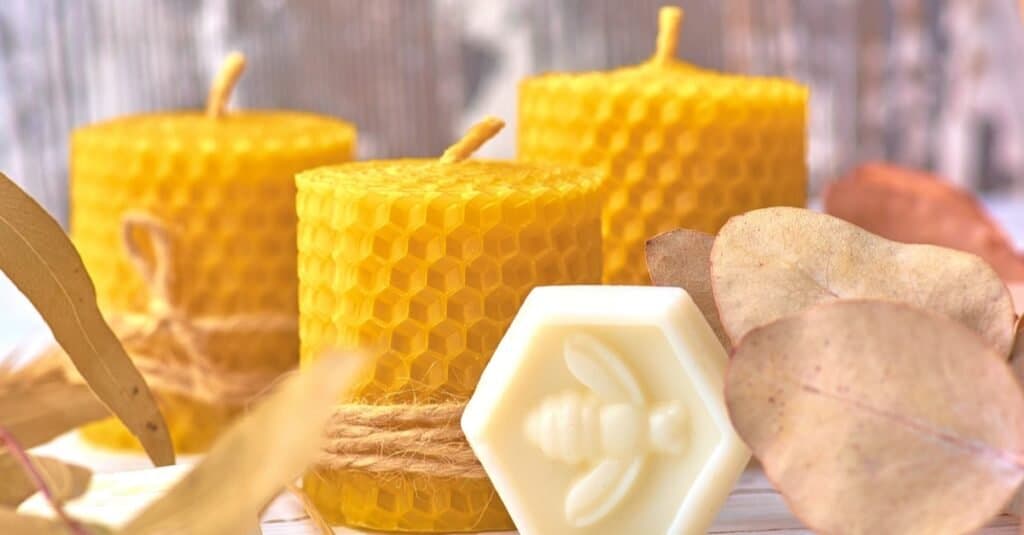
Burning candles can certainly help repel mosquitoes, but it might not be as efficient as some other methods, depending on your usage.
©Morgit Dziuban/Shutterstock.com
Burning candles is a terrific option when you have to spend a lot of time indoors because they have the added benefit of reducing the smell of cigarettes and other unpleasant aromas. Citronella candles combine the advantages of a candle with the power of citronella oil to ward off insects, making them ideal for outdoor parties.
Because we deeply care about all critters here at A to Z Animals, we do want to mention that citronella isn’t safe to use around dogs or cats.
Screen Tent
The best option is a mesh tent to keep you safe from annoying mosquitos outdoors. There are plenty of great options on the market that come in a variety of different sizes and styles. Big box stores sell mosquito mesh, and these places as well as many hardware stores have pre-made screen tents.
The disadvantage of utilizing screening is that everybody must congregate in a compact area. It’s also not safe to have fires within a screen tent. Lastly, there is a lack of privacy with this type of enclosure.
Eliminate Standing Water
Mosquito larvae only require around an ounce of water to survive for a little over two weeks as they develop into mature mosquitoes. Mosquito eggs are laid close to bodies of water. There won’t be any mosquito breeding in the vicinity when there isn’t any water.
All empty containers should be discarded, and those that are kept ought to be flipped upside down. Some sources of standing water, such as pools and birdbaths, cannot simply be thrown away. Rather, make an effort to replace the water in them no less than once every week.
Other Insects Set to Emerge in Virginia
Now that you’re practically an expert on mosquitoes in Virginia, let’s talk about other insects that make an appearance around springtime in the Mother of States.
Spotted Lanternfly
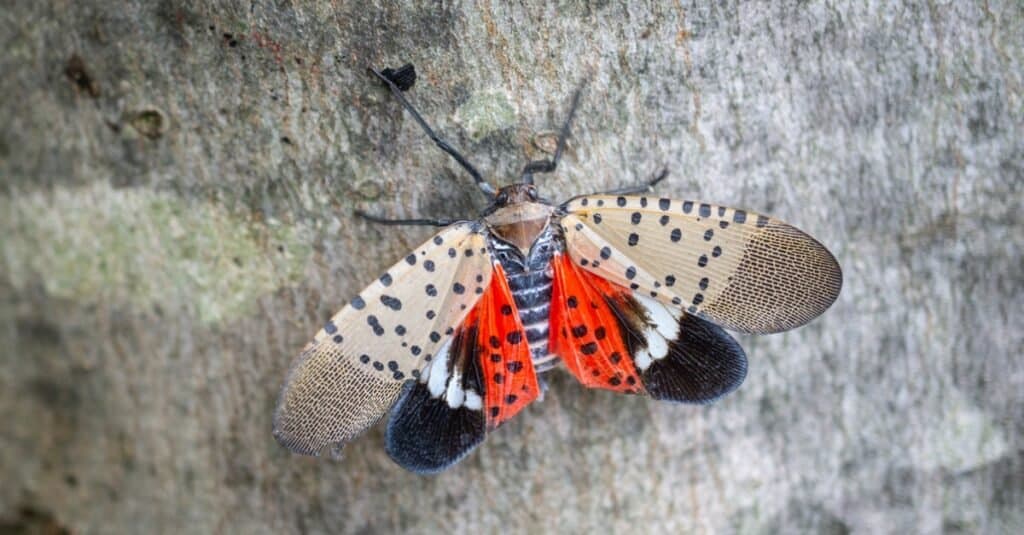
The
spotted lanternfly
has made quite the splash in the news in the past due to its aggressive damage to crops.
©iStock.com/arlutz73
Most insects can be ignored, but if you see a spotted lanternfly, get rid of it before its larvae emerge in early May. These insects present a severe threat to the country’s logging, orchard, and grape fields. Their existence has been proven in 14 states, including Virginia. Watch for spotted lanternfly groups of eggs when you mow the lawn in the spring.
Stink Bugs
In the fall, brown marmorated stink bugs often seek shelter inside homes. When spring rolls around, they start to emerge out of hibernation. Vegetable crops in Virginia are targeted by a variety of stink bug species.
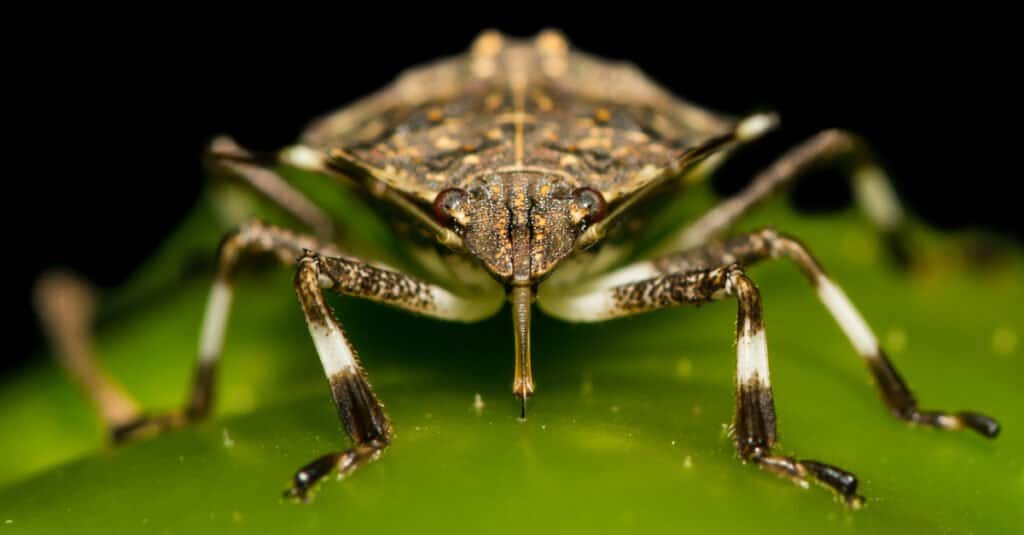
Brown marmorated stink bugs emerge from hibernation in the spring.
©Jay Ondreicka/Shutterstock.com
The brown marmorated stink bug, brown stink bug, green stink bug, and harlequin bug are the main species of pests. Be cautious if you spot them inside your home. If necessary, vacuum them or simply sweep them directly out the door, but do it as covertly as you can because, when scared, stink bugs exude a scent that will leave you breathless.
In the event that you vacuum stink bugs, make sure you change the bag right away. If your vac is bagless, vinegar should be used to clean the dust canister.
Bees
The more pleasant insects, queen bees, will be searching within the blossoms for their next meal. They serve as crucial pollinators. In actuality, bees pollinate 75% of the food that people eat globally.
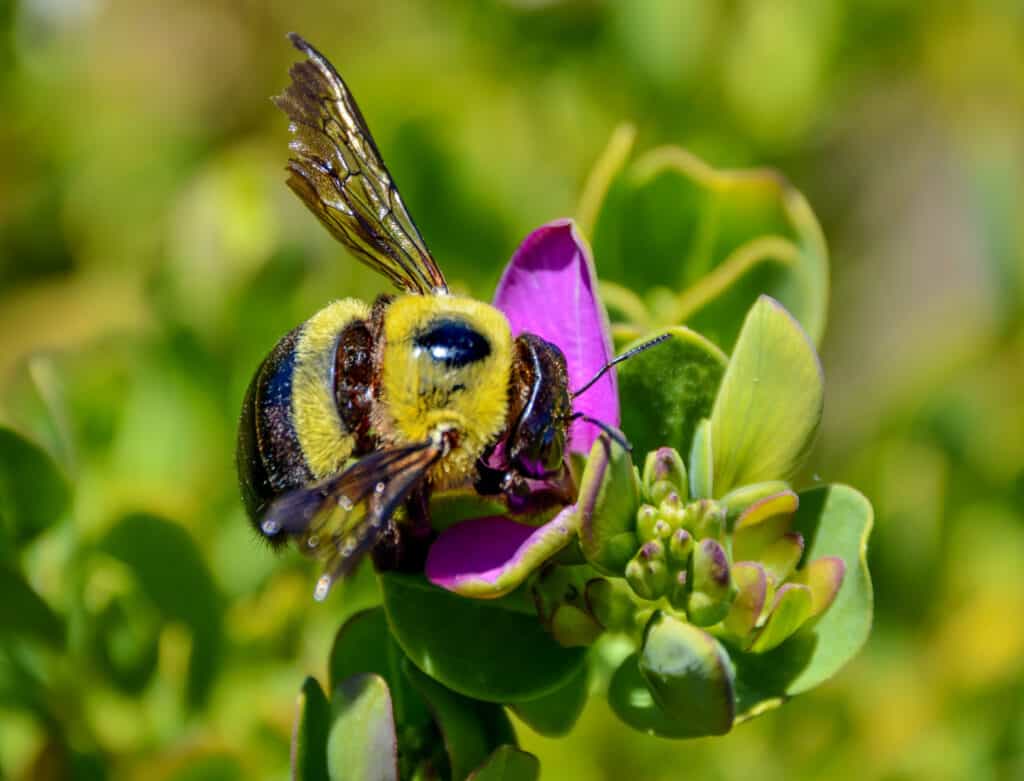
Carpenter bees are just one of several bee species that live in Virginia.
©Cathy Withers-Clarke/Shutterstock.com
According to the National Conference of State Legislatures, a minimum of 28 states, including Virginia, have passed legislation to protect pollinators. Bees are having problems. Worldwide, their numbers are dwindling, and we must take action to reverse this trend.
Echinacea, snapdragon, hostas, and wildflowers are good landscaping choices since bees perceive color and adore blooms that are yellow, purple, blue, or white. Consider using plants that attract bees while you are gardening or landscaping your vegetable garden this year.
Final Thoughts
Although mosquitoes are annoying, dangerous, and unwanted pests, there are a plethora of ways to get rid of them. We hope this guide helps you keep your home and yard free of these critters all summer long!
Summary of the 4 Types of Mosquitoes Set to Invade Virginia
| Mosquito | Diseases Carrried | |
|---|---|---|
| 1 | House Mosquito | West Nile Virus |
| 2 | Southern Mosquito | West Nile and Zika virus |
| 3 | Yellow Fever Mosquito | Yellow Fever and Zika |
| 4 | Diseases Carried | West Nile virus, Zika virus, yellow fever, dengue fever, chikungunya fever, and more |
The photo featured at the top of this post is ©
Thank you for reading! Have some feedback for us? Contact the AZ Animals editorial team.




